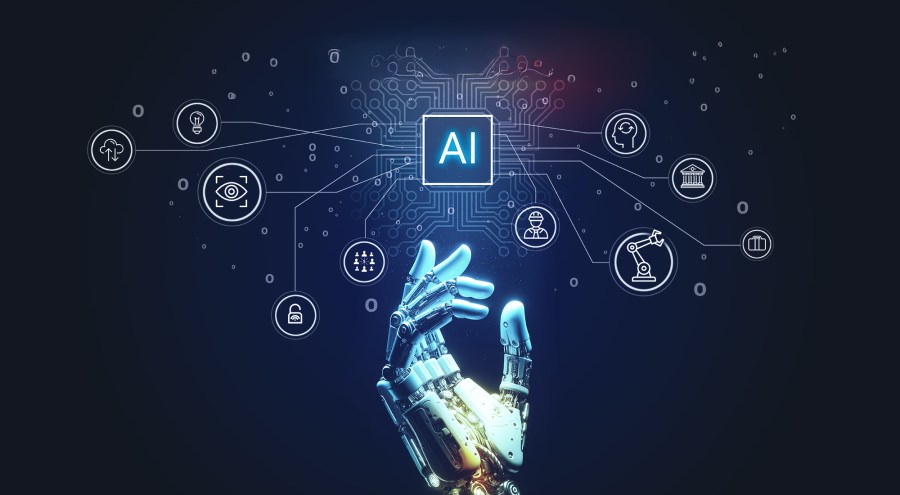Artificial Intelligence: Transforming the World Around Us
Introduction
Artificial Intelligence (AI) is no longer a futuristic concept — it’s part of our everyday lives. From virtual assistants like Siri and Alexa to advanced machine learning systems used in healthcare, finance, and education, AI is shaping how we live, work, and interact. The technology is rapidly evolving, creating new opportunities, challenges, and even ethical debates.
In this article, we’ll explore what AI is, its applications, benefits, challenges, and its impact on the future.

What is Artificial Intelligence?
Artificial Intelligence (AI) refers to the ability of machines and computer systems to simulate human intelligence. It involves processes such as:
- Learning from data
- Recognizing speech or images
- Understanding natural language
- Making decisions and predictions
AI can be categorized into two main types:
- Narrow AI → Designed to perform specific tasks (e.g., chatbots, recommendation engines).
- General AI → A theoretical form of AI that can perform any intellectual task like a human.
Key Applications of AI
1. Healthcare
- AI-powered diagnostic tools help doctors detect diseases earlier.
- Robots assist in surgeries with high precision.
- Chatbots provide instant health advice and patient support.
2. Finance
- AI algorithms detect fraud in real time.
- Automated trading systems make stock market predictions.
- Banks use AI to provide personalized financial advice.
3. Education
- Adaptive learning platforms personalize lessons for each student.
- AI grading systems help teachers save time.
- Language translation tools make learning global.
4. Transportation
- Self-driving cars rely heavily on AI.
- AI optimizes traffic management in smart cities.
- Airlines use AI for predictive maintenance.
5. E-commerce
- Recommendation engines suggest products based on browsing history.
- Chatbots handle customer service 24/7.
- AI detects fake reviews and improves user trust.
6. Entertainment
- Streaming platforms like Netflix and Spotify use AI to recommend shows and songs.
- Video game developers use AI to create smarter and more engaging opponents.
Benefits of Artificial Intelligence
- Efficiency and Automation
AI automates repetitive tasks, saving time and reducing human error. - Better Decision-Making
With predictive analytics, AI helps businesses make smarter decisions. - Cost Savings
By automating processes, companies reduce operational costs. - 24/7 Availability
Unlike humans, AI systems can work around the clock. - Personalization
AI provides personalized experiences in shopping, learning, and entertainment.
Challenges and Concerns
While AI offers many benefits, it also raises challenges:
1. Job Loss
Automation could replace millions of jobs, especially in manufacturing, customer service, and logistics.
2. Bias and Fairness
AI systems can inherit biases from the data they are trained on, leading to unfair decisions.
3. Privacy Concerns
AI often relies on personal data, raising questions about security and misuse.
4. Dependence on Technology
Over-reliance on AI may reduce critical thinking and problem-solving skills in humans.
5. Ethical Issues
From autonomous weapons to surveillance, AI raises deep ethical debates about how far technology should go.
The Future of Artificial Intelligence
1. AI in the Workplace
AI will not only automate tasks but also create new job roles requiring advanced skills.
2. AI and the Metaverse
As companies like Meta invest in virtual worlds, AI will play a key role in creating immersive experiences.
3. Healthcare Innovations
Future AI systems may predict diseases before symptoms appear, saving millions of lives.
4. Sustainable Development
AI will help fight climate change by improving energy efficiency and monitoring environmental changes.
5. Human-AI Collaboration
Instead of replacing humans, the future lies in collaboration — where AI handles routine work while humans focus on creativity and innovation.
Conclusion
Artificial Intelligence is revolutionizing industries, economies, and societies worldwide. While it presents challenges such as job displacement and ethical concerns, the potential benefits far outweigh the risks if managed properly.
The future will not be about humans vs. AI, but humans working with AI to create smarter, more efficient, and more innovative solutions. For individuals, businesses, and governments, adapting to AI is no longer optional — it is essential for growth and survival in the digital era.